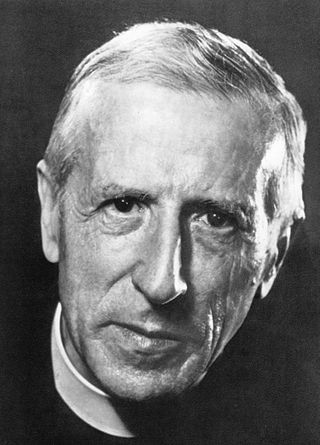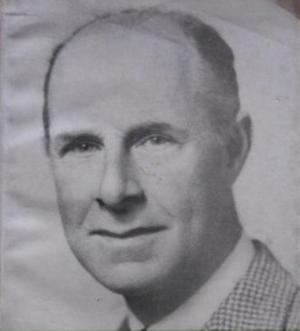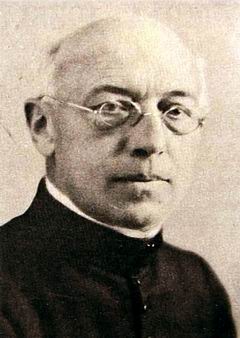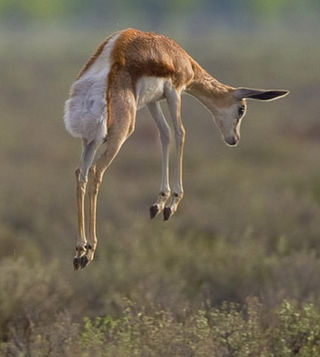Related Research Articles
The noosphere is a philosophical concept developed and popularized by the biogeochemist Vladimir Vernadsky and philosopher and Jesuit priest Pierre Teilhard de Chardin. Vernadsky defined the noosphere as the new state of the biosphere, and described it as the planetary "sphere of reason". The noosphere represents the highest stage of biospheric development, that of humankind's rational activities.

Pierre Teilhard de Chardin was a French Jesuit, Catholic priest, scientist, paleontologist, theologian, philosopher, and teacher. He was Darwinian and progressive in outlook and the author of several influential theological and philosophical books. His mainstream scientific achievements included taking part in the discovery of Peking Man. His more speculative ideas, sometimes criticized as pseudoscientific, have included a vitalist conception of the Omega Point and the development along with Vladimir Vernadsky of the concept of a noosphere.
The Omega Point is a theorized future event in which the entirety of the universe spirals toward a final point of unification. The term was invented by the French Jesuit Catholic priest Pierre Teilhard de Chardin (1881–1955). Teilhard argued that the Omega Point resembles the Christian Logos, namely Christ, who draws all things into himself, who in the words of the Nicene Creed, is "God from God", "Light from Light", "True God from True God", and "through him all things were made". In the Book of Revelation, Christ describes himself three times as "the Alpha and the Omega, the beginning and the end". Several decades after Teilhard's death, the idea of the Omega Point was expanded upon in the writings of John David Garcia (1971), Paolo Soleri (1981), Frank Tipler (1994), and David Deutsch (1997).

Roger Garaudy was a French philosopher, French resistance fighter and a communist author. He converted to Islam in 1982. In 1998, he was convicted for several years and fined for Holocaust denial under French law for claiming that the death of six million Jews was a "myth".
Chardin is a French surname. Notable people with the surname include:

"Nothing in Biology Makes Sense Except in the Light of Evolution" is a 1973 essay by the evolutionary biologist Theodosius Dobzhansky, criticising anti-evolution creationism and espousing theistic evolution. The essay was first published in American Biology Teacher in 1973.
George I. Mavrodes was an American philosopher and Professor Emeritus of Philosophy at the University of Michigan.

Thomas Mulvihill King, S.J. was a professor of theology at Georgetown University. King entered the Society of Jesus in 1951 after completing undergraduate studies in English at the University of Pittsburgh. As a Jesuit, he undertook further studies at Fordham University and Woodstock College and was ordained a Roman Catholic priest in 1964. After completing a doctorate in theology at the University of Strasbourg in 1968, King began teaching at Georgetown. A member of the American Teilhard Association, he has written or edited several books on Pierre Teilhard de Chardin, including Teilhard's Mysticism of Knowing (1981), Teilhard and the Unity of Knowledge (1983) Teilhard de Chardin (1988), The Letters of Teilhard de Chardin and Lucile Swan (1993) and Teilhard's Mass (2005). His other works include Sartre and the Sacred (1974), Enchantments: Religion and the Power of the Word (1989), Merton: Mystic at the Center of America (1992) and Jung's Four and Some Philosophers (1999). He also wrote the introduction for a new 2004 translation by Sion Cowell of Teilhard's The Divine Milieu.
Evolutionary epistemology refers to three distinct topics: (1) the biological evolution of cognitive mechanisms in animals and humans, (2) a theory that knowledge itself evolves by natural selection, and (3) the study of the historical discovery of new abstract entities such as abstract number or abstract value that necessarily precede the individual acquisition and usage of such abstractions. As a branch of inquiry in epistemology, evolutionary epistemology lies at the crossroads of philosophy and evolutionary biology.

Pierre Lecomte du Noüy was a French biophysicist and philosopher. He is probably best remembered by scientists for his work on the surface tension, and other properties, of liquids.
Édouard Louis Emmanuel Julien Le Roy was a French philosopher and mathematician.
Everything That Rises Must Converge is a collection of short stories written by Flannery O'Connor during the final decade of her life. The collection's eponymous story derives its name from the work of Pierre Teilhard de Chardin. The collection was published posthumously in 1965 and contains an introduction by Robert Fitzgerald. Of the volume's nine stories, seven had been printed in magazines or literary journals prior to being collected, including three that won O. Henry Awards: "Greenleaf" (1957), "Everything That Rises Must Converge" (1963), and "Revelation" (1965). "Judgment Day" is a dramatically reworked version of "The Geranium", which was one of O'Connor's earliest publications and appeared in her graduate thesis at the University of Iowa. "Parker's Back", the collection's only completely new story, was a last-minute addition.

The global brain is a neuroscience-inspired and futurological vision of the planetary information and communications technology network that interconnects all humans and their technological artifacts. As this network stores ever more information, takes over ever more functions of coordination and communication from traditional organizations, and becomes increasingly intelligent, it increasingly plays the role of a brain for the planet Earth. In the philosophy of mind, global brain finds an analog in Averroes's theory of the unity of the intellect.

Émile Licent was a French Jesuit trained as a natural historian. He spent more than twenty-five years researching in Tianjin. His expeditions spread across various parts of Northern and Central China.

The Phenomenon of Man is an essay by the French geologist, paleontologist, philosopher, and Jesuit priest Pierre Teilhard de Chardin. In this work, Teilhard describes evolution as a process that leads to increasing complexity, culminating in the unification of consciousness. The text was written in the 1930s, but it achieved publication only posthumously, in 1955.
Supermind, in Sri Aurobindo's philosophy of integral yoga, is the dynamic manifestation of the Absolute, and the intermediary between Spirit and the manifest world, which enables the transformation of common being into Divine being.
Events from the year 1699 in France.

Léontine Zanta was a French philosopher, feminist and novelist. One of the first two women to gain a doctorate in France, and the first to do so in philosophy, Zanta "was an intellectual celebrity in her day, active in journalism and in the feminist movement of the 1920s."
Mel Thompson is an English writer and philosopher. He was formerly a teacher, editor and A level examiner.

Teleology in biology is the use of the language of goal-directedness in accounts of evolutionary adaptation, which some biologists and philosophers of science find problematic. The term teleonomy has also been proposed. Before Darwin, organisms were seen as existing because God had designed and created them; their features such as eyes were taken by natural theology to have been made to enable them to carry out their functions, such as seeing. Evolutionary biologists often use similar teleological formulations that invoke purpose, but these imply natural selection rather than actual goals, whether conscious or not. Some biologists and religious thinkers held that evolution itself was somehow goal-directed (orthogenesis), and in vitalist versions, driven by a purposeful life force. With evolution working by natural selection acting on inherited variation, the use of teleology in biology has attracted criticism, and attempts have been made to teach students to avoid teleological language.
References
- ↑ Howard, Don A. "Einstein's Philosophy of Science". The Stanford Encyclopedia of Philosophy. Retrieved 2013-02-08.